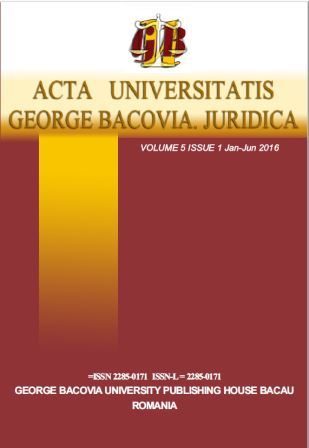Explicații referitoare la competența procurorului
în faza de urmărire penală
Explanations relating to the competence of the public prosecutor at the stage of criminal prosecution
Author(s): Adrian LupaşcuSubject(s): Law, Constitution, Jurisprudence
Published by: Editura Universităţii George Bacovia din Bacău România
Keywords: competence; prosecutor; criminal investigation; control; surveillance; preventive measures
Summary/Abstract: In accordance with paragraph 1 of article 131 of the Constitution of Romania, in judicial activity,the Public Ministry shall represent the general interests of the society and defend legal order, as well as the rights andfreedoms of citizens. Details regarding the importance of the Prosecutor in the first phase of the criminal process -criminal prosecution - we can find in the new provisions of the Criminal Procedure Code (CPC). The legislator rethinksthe magistrates’ powers by freeing up large amount of specific activities, implicitly by restricting the category of crimesfor which the Prosecutor is obliged to carry out its own prosecution and not least through the creation of the institutionof judge of rights and freedoms. Starting from the premise that the mere proclamation of some procedure norms in theCPP is not sufficient to secure the reform of the judiciary system in our country and its quality increase [1], thejurisdiction of the Prosecutor should not be confined only to the activity carried out for the administration of evidenceor for explaining and protecting the rights and obligations of the parties. It encompasses a much wider area, regulatedby the legislator through special laws. According to the new regulations, the Prosecutor shall control, lead andsupervise the work of criminal investigation bodies, so as any offense can be revealed and any person who hascommitted it can be held criminally liable. Supervision of the prosecution is materialized in several ways: checking theprosecution documents, participation in carrying out criminal acts, confirmation or denial of enactments of criminalinvestigation bodies, passing the dossier from a research body to another or resolution of complaints made against actsof criminal investigation which have brought an injury to the rights and legitimate interests of persons [2]. This paperaims to explain the role, attributions and importance of the Prosecutor in the first phase of the criminal process.
Journal: Acta Universitatis George Bacovia. Juridica
- Issue Year: V/2016
- Issue No: 1
- Page Range: 221-248
- Page Count: 28
- Language: English, Romanian

